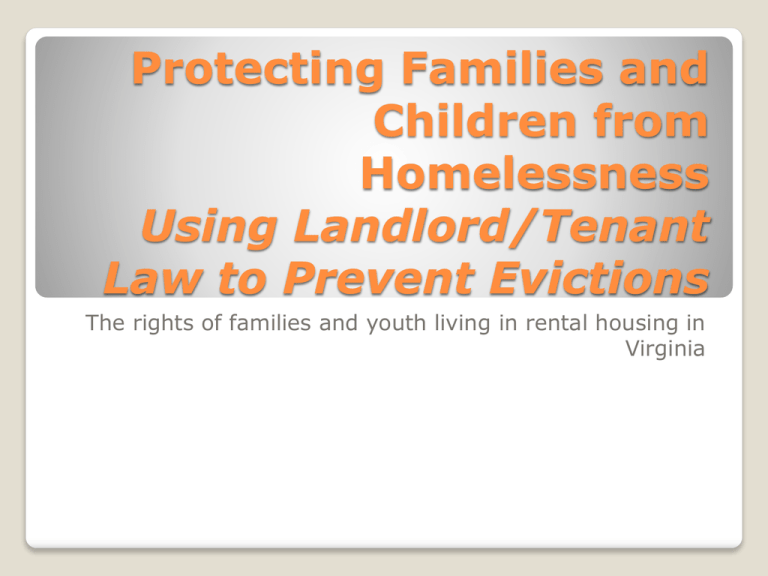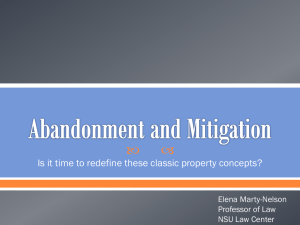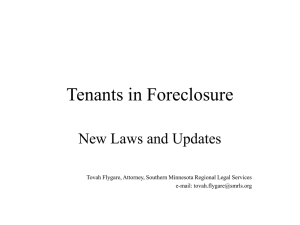Landlord Tenant Law HOME Rental Housing Christie Marra
advertisement

Protecting Families and Children from Homelessness Using Landlord/Tenant Law to Prevent Evictions The rights of families and youth living in rental housing in Virginia Christie Marra Staff Attorney in Housing, Family and Child Welfare Law Virginia Poverty Law Center Richmond, Virginia (804) 782-9430, x16 christie@vplc.org Presenter Information A tenant is anyone who pays rent to someone else in exchange for lodging Tenants can live in apartments, duplexes, single family homes, manufactured homes/trailers or individual rooms Tenants can pay their rent by the week, month or at some other interval the landlord and tenant agree upon People living in hotels or motels for more than 90 continuous days are tenants Who is a tenant in Virginia? The landlord can only enter at reasonable times and with prior notice to the tenant (at least 24 hours) The tenant must allow the landlord to enter, with proper notice, to inspect, make necessary repairs, supply services, show the unit to perspective purchasers, tenants or workers When can the landlord enter the tenant’s home? A landlord cannot actually evict a tenant until he has taken the tenant to court and obtained a writ of possession Use of “self-help” by landlords is unlawful in Virginia BUT an owner of a hotel, motel or other similar lodging can use self-help to evict guest who has lived there less than 90 days (must provide 5 days’ written notice to use self-help eviction for nonpayment) “Self-Help” occurs when the landlord locks the tenant out, or cuts off a utility, in order to try to evict the tenant without having to go to court When can a landlord evict a tenant? A landlord can terminate the lease and get an eviction order from the court if: ◦ The tenant doesn’t pay her rent when it’s due ◦ The tenant commits a material breach of the lease ◦ A material breach can be a single serious lease violation or repeated minor violations ◦ A criminal act that jeopardized the health and safety of other tenants by a tenant or her guest is grounds for lease termination When can a landlord get a court order to evict a tenant? Before the lease can be terminated, the landlord must send the tenant a “five day pay or quit” notice If the tenant pays everything she owes on or before the 5th day, the landlord can’t take her to court If she doesn’t pay by day 5 and the landlord takes her to court, she can still avoid eviction if she pays everything she owes (including court costs and attorneys fees) by the court date (“Redemption” is allowed once every 12 months) What happens if the tenant pays her rent before the court date? If a tenant obtains a written promise from a nonprofit or local government agency that the agency will pay the rent, late fees and any other amount sued for, the tenant can bring the written promise (called a “redemption tender”) to court and the case will be continued for 10 days. If the tenant does not make the promised payment on or before the new court date, the landlord will get immediate possession of the tenant’s dwelling unit What if a tenant can get the rent a few days after the court date? There are two types of material breaches, remediable and non-remediable. Very few breaches are non-remediable. Tenants who commit remediable breaches are entitled to 21 days to remedy/fix the problem that caused the breach (21/30 notice) if Virginia Residential Landlord Tenant Act applies VRLTA applies if housing is multifamily OR landlord owns more than TWO single family rental homes (as of 7/1/2014) Repeat violations are not remediable Are all material breaches grounds for eviction of the tenant? If an act of family abuse is committed against a tenant AND the abuser has been barred by a preliminary or final protective order or by the landlord based on family abuse, the landlord cannot terminate the tenant’s lease because of the abuse Tenant must provide landlord with documentation within 21 days of incident Does not apply if abuser returns to premises after the act of family abuse and tenant fails to notify the landlord within 24 hours What if the tenant is a DV victim and her abuser causes the breach by assaulting the tenant? Written leases will state when they terminate. Many will automatically renew unless one party gives notice to the other that they want the lease to end. If there’s no written lease, leases run month-to-month, unless the rent is paid weekly. Month to month leases require 30 days’ notice to terminate; week to week require 7 days’ notice. When does a lease terminate? A tenant with a final protective order for family abuse or conviction of her abuser for family abuse, sexual violence or sexual abuse can terminate her lease with advance written notice (30 DAYS BEFORE NEXT RENT IS DUE) Tenant can terminate her lease when the protective order (or extension) is in effect AND can terminate a lease in effect when the conviction order is entered and one subsequent lease Can a domestic violence survivor end her lease early for safety? A security deposit is collected before move-in and cannot be more than two months’ rent Tenants have a right to do move-in and move-out inspections with the landlord, and the landlord must provide written inspection reports to the tenant The landlord has 45 days after the lease ends and the tenant returns the key to return the security deposit (minus lawful deductions) to the tenant Tenancy must be covered by VRLTA for above When does a tenant get her security deposit back? Key Characteristics of Subsidized Housing Programs: ◦ Conventional Public Housing: Owned and operated by local Public Housing Authority ◦ Project Based Section 8: Owned by private for-profit or non-profit LL; Certain number of units in building reserved for Section 8 tenants ◦ Section 8 Housing Choice voucher: Tenants take their Section 8 vouchers to private LL; vouchers pay all or part of rent (Tenant share of rent = 30% of adjusted income) ◦ Section 202: Project based for elderly, low-income (less than 50% area median income) ◦ Section 811: Project based (old) and subsidies (new) for people with disabilities (<50% AMI) How do advocates know which subsidized housing clients have? The Family Unification Program provides Housing Choice (Section 8) vouchers to: 1. Families for whom lack of adequate housing is likely to cause: Imminent placement of a child into foster care, or The delay of the return of a child from foster care 2. Youth between 18 and 21 who left foster care at 16 or older and lack adequate housing. How does the Family Unification Program fit in ? 1. Family Unification Program vouchers are grant funded through joint applications by the local public housing authority and the local child welfare agency. They are not available everywhere. 2. Youth FUP vouchers are limited to 18 months. There are no time limits for family FUP vouchers. 3. Youth must be provided IL services along with the voucher. What are the limits of FUP? A family or youth lacks adequate housing if they are: ◦ ◦ ◦ ◦ ◦ ◦ Living in substandard/dilapidated housing Homeless In imminent danger of losing their home Displaced by domestic violence Living in an overcrowded unit Living in housing not accessible due to a disability of a child or youth What does it mean to “lack adequate housing” for FUP ? The following localities were awarded FUP vouchers between FY2008 and FY2010: ◦ ◦ ◦ ◦ ◦ ◦ Danville Roanoke Harrisonburg Fairfax Arlington Prince William AND: Alexandria and Albemarle (pre-2008) Which Virginia localities have been awarded FUP vouchers? A tenant’s right to remain in subsidized housing depends on the type of housing she has: ◦ Conventional Public Housing: Tenant remains in the housing unless she is evicted for good cause. ◦ Section 8 voucher housing: The tenancy is determined by the lease between the tenant and the private landlord; however, the lease cannot be terminated during the lease term except for good cause. How long can a tenant stay in subsidized housing? “Good cause” generally is a serious lease violation (such as nonpayment of rent) or repeated minor lease violations. Examples of good cause: ◦ Criminal activity ◦ Disturbance at the dwelling unit that disturbs the other residents’ peaceful enjoyment ◦ Damage to the dwelling unit ◦ Nonpayment of rent ◦ Unauthorized household member What is “good cause” to terminate a tenant’s subsidized housing? Domestic violence, stalking or sexual assault cannot be treated as a lease violation by the survivor Criminal activity related to domestic violence or sexual assault cannot be used to terminate the survivor’s lease or subsidy PHA or private landlord receiving a Section 8 voucher can bifurcate the lease to remove the abuser Are there exceptions to the “good cause” rule for domestic violence? PHA can require verification to be provided within 14 days of request 3 types of acceptable verification: ◦ Survivor’s statement on a HUD-approved form ◦ Statement from a qualified third party (such as a domestic violence counselor) ◦ A police or court record What is required to qualify for the domestic violence exceptions? Pre-termination proceeding for Public Housing Tenants: ◦ Informal meeting ◦ Pre-eviction grievance hearing ◦ State Court proceeding Pre-termination proceedings for Section 8 voucher tenants: ◦ Lease termination – State Court (AP=private LL) ◦ Voucher termination – Informal meeting (AP=PHA) How can a tenant assert her rights if the PHA isn’t following the law? All residential tenants have the right to file a Tenant’s Assertion in General District Court to ask the court to order the LL to make repairs, reduce the rent for the period of time the repairs aren’t made and/or terminate the lease In order to file a Tenant’s Assertion, the tenant must first send landlord a written request to make the repairs AND must be current on his or her rent What can a tenant do if a landlord isn’t making needed repairs? Protecting Tenants at Foreclosure Act: ◦ Federal Law ◦ Due to expire December 31, 2014 ◦ “Immediate successor in interest” (including bank) takes the foreclosed property subject to the rights of the tenant ◦ Successor in interest (new owner) must provide tenant at least 90 days notice to vacate the premises ◦ Tenant must be allowed to stay until the end of the lease UNLESS the property is sold to a purchaser who will live their as his primary residence OR there is no lease What happens to tenants living in properties that are foreclosed on?





